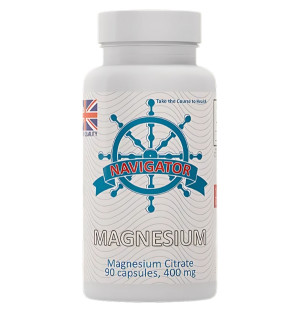Magnesium
Magnesium - support for muscles, nervous system and heart health
Magnesium is one of the most important minerals in the human body, essential for the proper functioning of many biological processes. It is involved in more than 300 enzymatic reactions, making it a key element for metabolism, muscle function, the nervous system, the heart and bone health. Magnesium helps to maintain electrolyte balance, supports proper immune system function, as well as having a relaxing effect on muscles and supporting mental health.
Magnesium deficiencies are relatively common because our diet often does not provide enough of this mineral. Stress, intense physical exertion, as well as certain diseases and health conditions can increase the need for magnesium. For this reason, magnesium supplementation is a popular option, especially among people who want to take care of their muscle, heart and nervous system health.
Main benefits and functions of magnesium
✅ Support for muscle health
-
- Magnesium plays a key role in muscle function, as it is responsible for the relaxation of muscles after contraction. Magnesium deficiency can lead to excessive cramps, muscle tremors and painful cramps, especially at night. Regular magnesium supplementation helps to prevent these problems, support muscle recovery after exercise and keep muscle health in check. For athletes and physically active people, magnesium is important in preventing injuries and cramps.
✅ Nervous system support and stress reduction
-
- Magnesium is essential for the proper functioning of the nervous system. It helps regulate nerve conduction, which has an impact on our mood, concentration and responses to stress. Magnesium deficiency can lead to increased irritability, concentration problems and even anxiety and depression. Magnesium has a relaxing effect, aiding mental balance, and also improves sleep quality, making it an excellent remedy for stress and tension.
✅ Regulation of blood pressure and support for heart health
-
- Magnesium helps to regulate blood pressure by acting to relax the blood vessels, which reduces the risk of hypertension. Magnesium deficiency has been linked to a higher risk of cardiovascular diseases such as atherosclerosis, arrhythmia and heart attack. Regular magnesium supplementation helps to support cardiovascular health, regulate heart rhythm and reduce the risk of blood clots.
✅ Support of metabolism and energy production
-
- Magnesium is involved in the production and storage of energy at the cellular level and is therefore essential for physically active people and those with high energy needs. It supports the metabolism of carbohydrates, fats and proteins, which has a direct impact on the body's ability to use energy from food. Magnesium supplementation can improve performance, prevent fatigue and promote better energy management.
✅ Bone and dental health
-
- Magnesium is essential for proper bone mineralisation as it helps regulate calcium and vitamin D levels in the body. Adequate levels of magnesium in the diet support bone and dental health, reducing the risk of osteoporosis and other bone problems. Magnesium also influences the proper functioning of smooth muscle, which is important for joint and spinal health.
✅ Support for electrolyte balance
-
- Magnesium, like potassium and sodium, is a key electrolyte that helps to maintain fluid balance in the body. It is essential for normal cell function, transport of nutrients and removal of metabolic by-products. Magnesium supplementation promotes proper hydration of the body and prevents electrolyte imbalances, especially in people at risk of excessive fluid loss (e.g. during intense physical exertion).
✅ Mental health support
-
- Magnesium plays an important role in regulating neurotransmitters that affect mood and wellbeing. It can help reduce symptoms of depression, anxiety and improve sleep quality. Magnesium deficiency can lead to mood problems, irritability, feelings of mental fatigue, and sleep problems.
Types of magnesium in supplements
🟧 Magnesium citrate
-
- Magnesium citrate is one of the best absorbed forms of magnesium and is often used in dietary supplements. It is effective in treating magnesium deficiencies, supporting muscle function, the nervous system and helping to regulate digestion. Magnesium citrate can have a slightly laxative effect, which is why it is often used in supplements to aid digestion.
🟧 Magnesium chloride
-
- Magnesium chloride is a well-absorbed form of magnesium that supports the nervous system, muscle function and electrolyte balance. It is also available in a form for external application, in the form of magnesium oil, which supports the relief of muscle and joint pain.
🟧 Magnesium oxide
-
- Magnesium oxide contains large amounts of magnesium, but is less bioavailable than other forms. It is mainly used as a laxative or to aid digestion because it has an osmotic effect, which attracts water to the intestines.
🟧 Magnesium glycinate
-
- Magnesium glycinate is a form of chelated magnesium that has high bioavailability and is gentle on the digestive system. It is particularly recommended for people with sensitive digestive systems who need effective supplementation without the risk of side effects.
🟧 Magnesium lactate
-
- Magnesium lactate is another form of magnesium with good bioavailability, often used in supplements to support muscle and nervous system health. It is gentle on the stomach and can be used by people with sensitive digestive systems.
🟧 Magnesium taurate
-
- Magnesium taurate is a form of magnesium linked to the amino acid taurine, which has particularly beneficial effects on heart and nervous system health. It is an excellent choice for those looking to improve cardiovascular health and support cognitive function.
Symptoms of magnesium deficiency
- Muscle cramps and tremors: Painful cramps, muscle tremors and general muscle weakness can be a sign of magnesium deficiency.
- Fatigue and weakness: People with magnesium deficiency often experience chronic fatigue, lack of energy and problems concentrating.
- Sleep problems: Magnesium helps regulate sleep, so a deficiency can lead to difficulty falling asleep, interrupted sleep and insomnia.
- Nervousness and irritability: Magnesium supports the nervous system, so a deficiency can lead to excessive irritability, nervousness and anxiety.
- Heart rhythm disorders: Magnesium deficiency can lead to heart problems such as arrhythmia.
Who should consider magnesium supplementation?
❎ Physically active people: Athletes and people who regularly participate in sports lose magnesium through sweat, so supplementation can support muscle recovery and prevent cramps.
❎ People exposed to stress: Magnesium has a relaxing effect on the nervous system, so people struggling with stress can benefit from its calming properties.
❎ People with cardiovascular problems: Magnesium supports heart health and regulates blood pressure, so people with hypertension or arrhythmia can benefit from supplementation.
❎ People with sleep problems: Magnesium can improve the quality of sleep and help those struggling with insomnia problems.
❎ Older people: Older people are more prone to magnesium deficiencies, which can affect bone, muscle and system health nerwowego.
Summary
Magnesium is a key mineral for muscle, nervous system, heart and metabolic health. Its supplementation can support muscle recovery, improve sleep quality, reduce stress and support cardiovascular function. The various forms of magnesium available in dietary supplements allow supplementation to be tailored to individual health needs, making magnesium one of the most important elements of a healthy diet and lifestyle.















